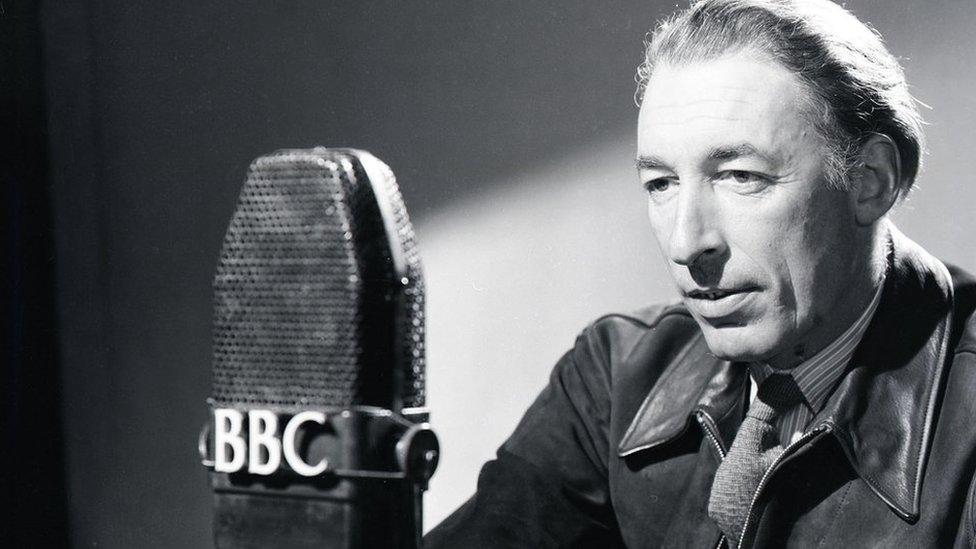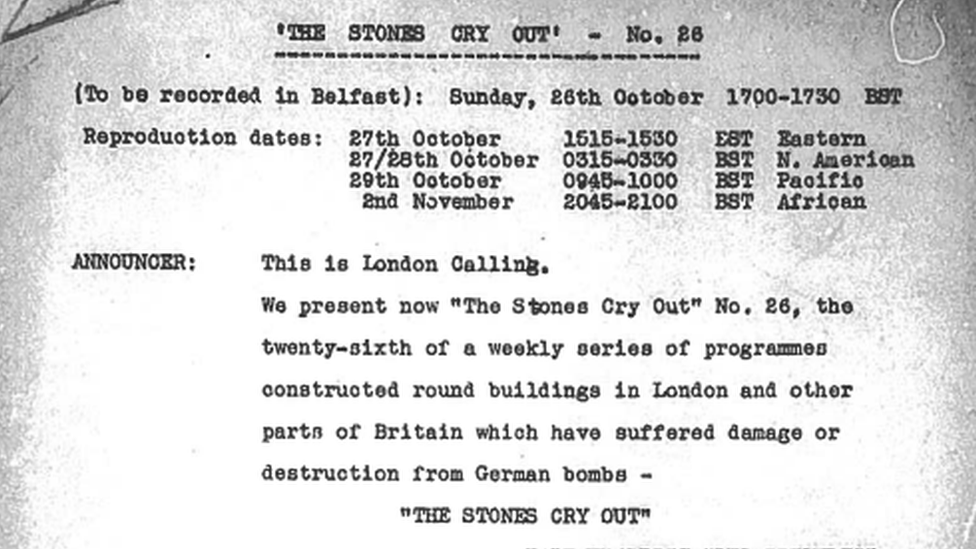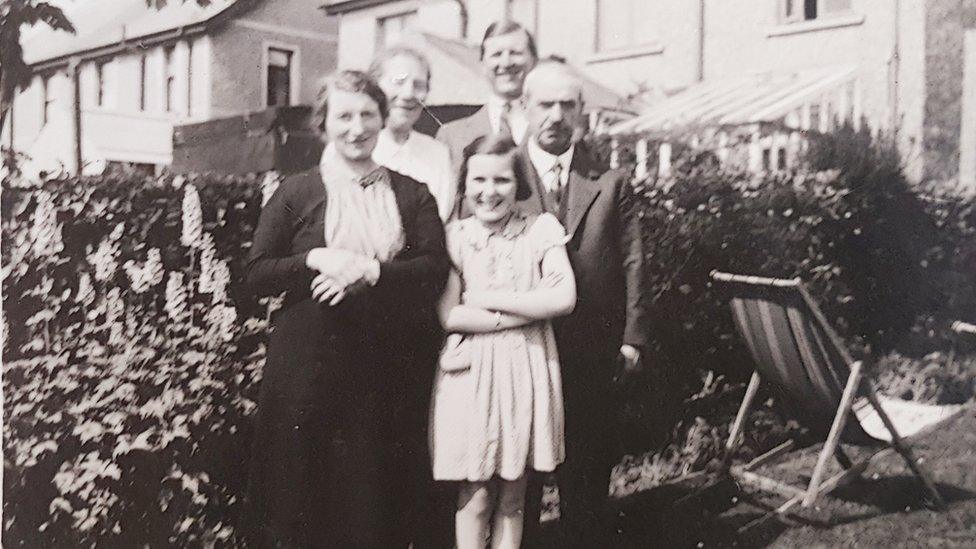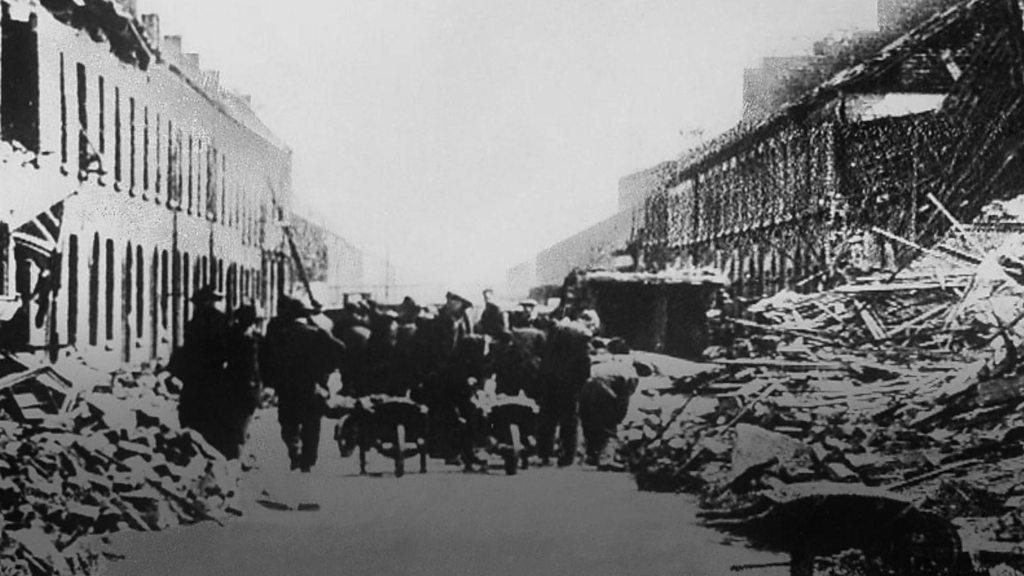Belfast Blitz: Louis MacNeice drama takes to the stage 80 years on
- Published

Several Luftwaffe raids devastated Belfast in spring 1941
He is one of Northern Ireland's best-known poets but Louis MacNeice was also a BBC radio producer.
And one of his productions made in the wake of the Belfast Blitz is being brought back to life to mark the end of BBC Northern Ireland's Book Week.
The Wireless Mystery Theatre will recreate MacNeice's A Belfast Home on stage at the Strand Arts Centre in Belfast on Sunday.
The drama-documentary was first broadcast by the BBC in 1941.
It is about the effect of the Belfast Blitz on the city and its people.
There is no surviving recording of the original programme - only a script - and this will be the first time it has been heard in the 80 years since it was broadcast.
Born in Belfast in 1907, MacNeice is one of Northern Ireland's most revered poets.
His poems like Snow, Prayer Before Birth and the long-poem Autumn Journal are still read and studied all over the world.

Louis MacNeice was both a poet and a BBC broadcaster
But in 1941 MacNeice joined the BBC where he began writing and producing radio programmes.
One of his first programmes was The Stones Cry Out, a series of 15-minute broadcasts aimed at an American audience, about the effect of the Blitz on the UK's cities, their people and buildings.
Several of the programmes were about London, including bomb damage to St Paul's Cathedral, Westminster Abbey and the House of Commons.
But in October 1941 MacNeice travelled to Broadcasting House in Belfast - which had only just opened - to record episode 26 in the series.
He called it A Home in Belfast.
It is that radio programme that the Wireless Mystery Theatre will recreate on the stage of the Strand Arts Centre and, according to Reggie Chamberlain-King from the company, it is quite a challenge.
"Wireless Mystery Theatre is Northern Ireland's only audio theatre and live radio play theatre company," he told BBC News NI.
"We create on the stage radio productions with live music and live sound effects.
"MacNeice, who had only really joined the BBC at that point, used his skills to look at the buildings that had been affected by the Blitz in Belfast.
"He weaved together documentary, sound effects, character acting, music and used his own skills as a poet to rewrite the words of the traditional song The Blue Hills of Antrim to reflect the city as it stood after the effects of the Blitz.
"The programmes were a mix between documentary and drama and they were there to celebrate the buildings that weathered the attacks by the Luftwaffe during the Second World War."

Only the script of the production survives
The original broadcast made in 1941 has not survived so the members of the Wireless Mystery Theatre have been working from a copy of the script from the BBC archive.
"We really are just trying to imagine as best we can what the BBC producers would have done with the words on the page as MacNeice put them.
"The BBC in 1941 probably got the BBC orchestra to play on this one but we have a very discreet ensemble of four players and singers who are also actors.
"We come together to create a tapestry of music and speech."
That includes the task of recreating the sound of looms in a linen mill, which MacNeice had recorded for the original broadcast.
The company's performance takes place at the Strand Arts Centre in east Belfast at 14:30 BST on Sunday.
The event also includes a short introduction by the writer Glenn Patterson and a screening of his BBC Northern Ireland profile of Louis MacNeice.
The event has been organised by the Seamus Heaney Centre at Queen's University as part of Book Week 2021, which is jointly organised by BBC Northern Ireland and Libraries NI.
Related topics
- Published15 April 2021

- Published15 April 2021
